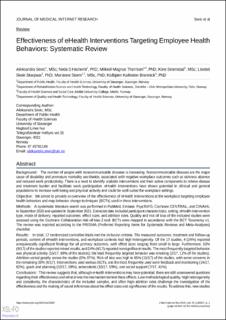| dc.identifier.citation | Sevic, A., Hashemi, N. S., Thørrisen, M. M., Strømstad, K., Skarpaas, L. S., Storm, M., & Brønnick, K. K. (2023). Effectiveness of eHealth Interventions Targeting Employee Health Behaviors: Systematic Review. Journal of Medical Internet Research, 25, e38307. | en_US |
| dc.description.abstract | Background:
The number of people with noncommunicable diseases is increasing. Noncommunicable diseases are the major cause of disability and premature mortality worldwide, associated with negative workplace outcomes such as sickness absence and reduced work productivity. There is a need to identify scalable interventions and their active components to relieve disease and treatment burden and facilitate work participation. eHealth interventions have shown potential in clinical and general populations to increase well-being and physical activity and could be well suited for workplace settings.
Objective:
We aimed to provide an overview of the effectiveness of eHealth interventions at the workplace targeting employee health behaviors and map behavior change techniques (BCTs) used in these interventions.
Methods:
A systematic literature search was performed in PubMed, Embase, PsycINFO, Cochrane CENTRAL, and CINAHL in September 2020 and updated in September 2021. Extracted data included participant characteristics, setting, eHealth intervention type, mode of delivery, reported outcomes, effect sizes, and attrition rates. Quality and risk of bias of the included studies were assessed using the Cochrane Collaboration risk-of-bias 2 tool. BCTs were mapped in accordance with the BCT Taxonomy v1. The review was reported according to the PRISMA (Preferred Reporting Items for Systematic Reviews and Meta-Analyses) checklist.
Results:
In total, 17 randomized controlled trials met the inclusion criteria. The measured outcomes, treatment and follow-up periods, content of eHealth interventions, and workplace contexts had high heterogeneity. Of the 17 studies, 4 (24%) reported unequivocally significant findings for all primary outcomes, with effect sizes ranging from small to large. Furthermore, 53% (9/17) of the studies reported mixed results, and 24% (4/17) reported nonsignificant results. The most frequently targeted behavior was physical activity (15/17, 88% of the studies); the least frequently targeted behavior was smoking (2/17, 12% of the studies). Attrition varied greatly across the studies (0%-37%). Risk of bias was high in 65% (11/17) of the studies, with some concerns in the remaining 35% (6/17). Interventions used various BCTs, and the most frequently used were feedback and monitoring (14/17, 82%), goals and planning (10/17, 59%), antecedents (10/17, 59%), and social support (7/17, 41%).
Conclusions:
This review suggests that, although eHealth interventions may have potential, there are still unanswered questions regarding their effectiveness and what drives the mechanism behind these effects. Low methodological quality, high heterogeneity and complexity, the characteristics of the included samples, and often high attrition rates challenge the investigation of the effectiveness and the making of sound inferences about the effect sizes and significance of the results. To address this, new studies and methods are needed. A megastudy design in which different interventions are evaluated in the same population over the same period on the same outcomes may solve some of the challenges. | en_US |

